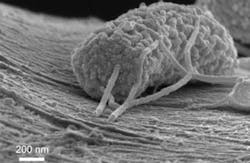Stanford researchers create ‘microbial battery’ to capture electricity in wastewater
Scientists at Stanford University have developed an innovative method for capturing energy in a special type of microbe in wastewater and using it to generate power.
The scientists have designed a special battery that is driven by naturally occurring bacteria. Researchers explained that the microbes are able to produce electricity as they digest organic waste, Stanford University said on its website.
According to the team of scientists, the technology is suitable for wastewater treatment plants and for dead zones in waterways, such as lakes and coastal waters, where organic pollution is depleting oxygen supply to aquatic life.
RELATED: New technology converts biosolids into hydrogen for electricity production
The existence of this unusual type of microbes, called exoelectrogenic bacteria, has been known to scientists for a long time and their energy has been targeted by academics for years but finding a commercially viable way to harness their energy has proved a major challenge.
The battery is very efficient but also quite simple, the scientists claimed. They estimate that it can harness around one-third of the potential energy present in wastewater, which is comparable to the rate of energy extracted by solar panels. Even though the amount of energy in wastewater is much lower than that in solar rays, the energy that can be extracted from wastewater could offset part of the energy used for its treatment, the website pointed out.
